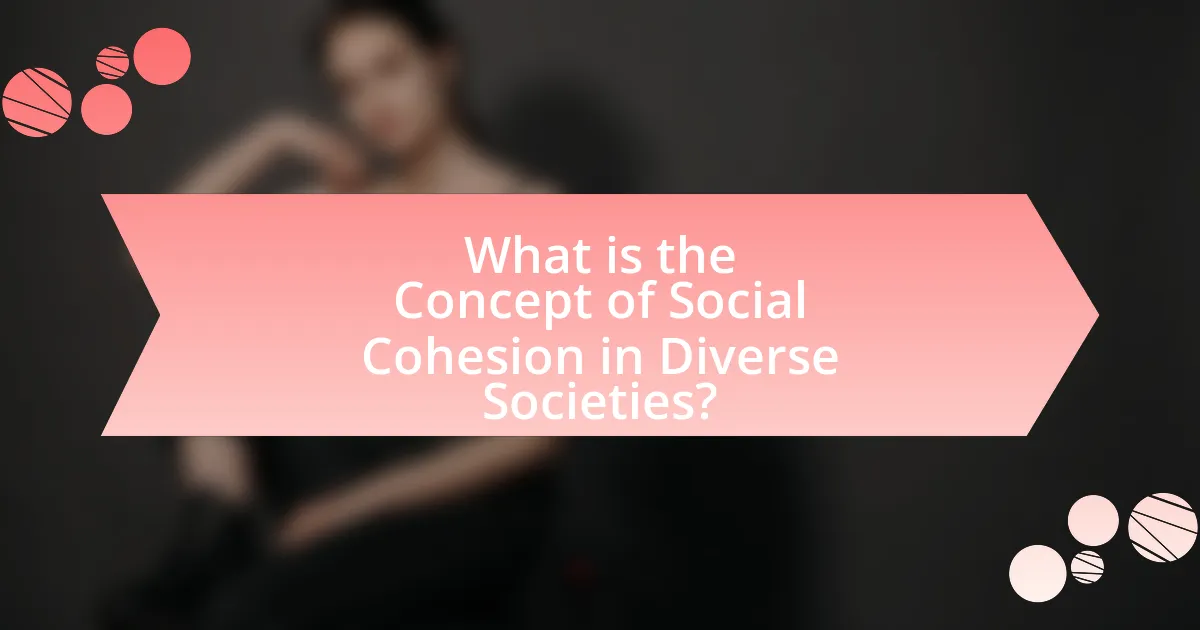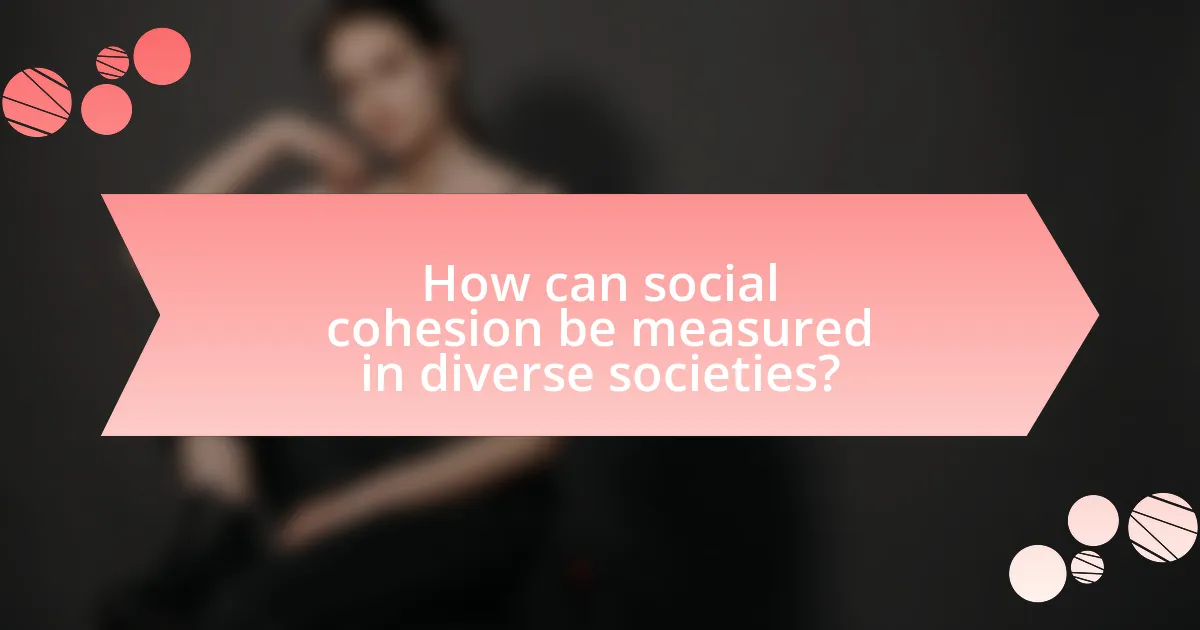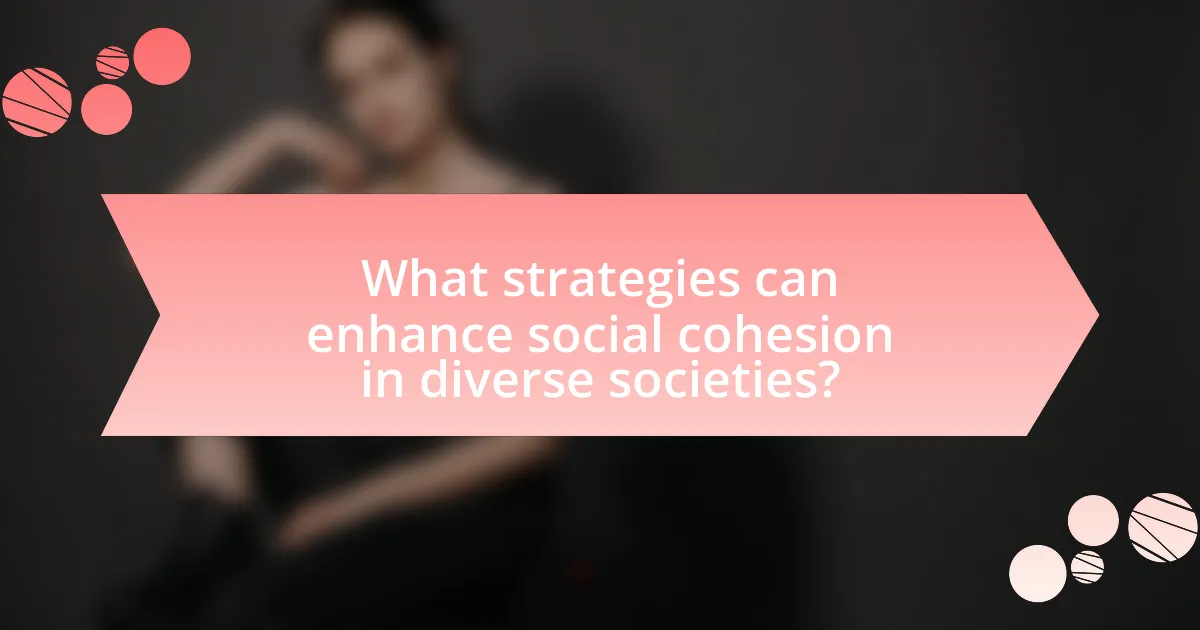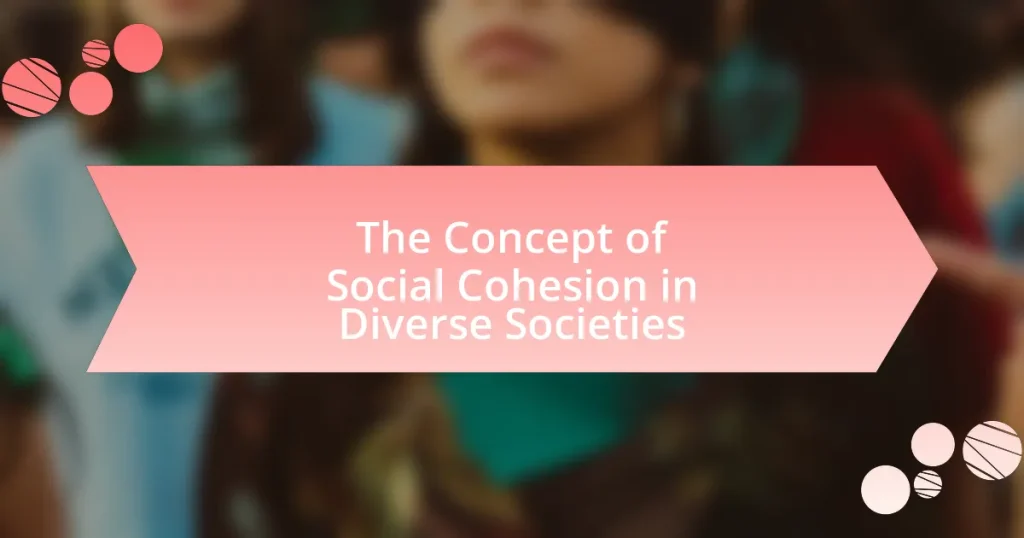The article focuses on the concept of social cohesion in diverse societies, defined as the strength of relationships and solidarity among individuals from various backgrounds. It explores key characteristics of social cohesion, such as shared values, trust, and social networks, and examines how these elements differ across cultures. The importance of social cohesion in fostering community stability, reducing conflict, and promoting economic development is highlighted, along with the factors influencing it, including socioeconomic status and cultural differences. Additionally, the article discusses strategies for enhancing social cohesion, such as inclusive policies and community engagement initiatives, while addressing the challenges posed by discrimination and political conflict.

What is the Concept of Social Cohesion in Diverse Societies?
Social cohesion in diverse societies refers to the strength of relationships and the sense of solidarity among individuals from different backgrounds. It emphasizes the importance of shared values, mutual respect, and social networks that connect people, fostering a sense of belonging despite cultural, ethnic, or social differences. Research indicates that social cohesion can enhance community resilience, reduce conflict, and promote social stability, as seen in studies like the “Social Cohesion and Conflict Prevention” report by the United Nations Development Programme, which highlights that cohesive societies are better equipped to manage diversity and promote inclusive development.
How is social cohesion defined in the context of diverse societies?
Social cohesion in the context of diverse societies is defined as the degree to which individuals from different backgrounds, cultures, and identities feel connected and integrated within a community. This concept emphasizes the importance of mutual respect, shared values, and social networks that facilitate cooperation and inclusion among diverse groups. Research indicates that social cohesion can enhance community resilience and promote social stability, as evidenced by studies showing that societies with higher levels of social cohesion experience lower rates of conflict and greater economic prosperity.
What are the key characteristics of social cohesion?
The key characteristics of social cohesion include shared values, social networks, trust, and a sense of belonging among individuals within a community. Shared values create a common identity, fostering unity and cooperation. Social networks facilitate interactions and support systems, enhancing community engagement. Trust among members is crucial for collaboration and conflict resolution, while a sense of belonging promotes individual well-being and collective stability. Research indicates that communities with high social cohesion experience lower crime rates and improved mental health outcomes, demonstrating the importance of these characteristics in fostering resilient societies.
How does social cohesion differ across various cultures?
Social cohesion varies significantly across cultures, influenced by factors such as social norms, values, and community structures. In collectivist cultures, like those in many Asian countries, social cohesion is often characterized by strong family ties and community interdependence, leading to a high level of social support and shared identity. Conversely, in individualistic cultures, such as those in Western countries, social cohesion may be more focused on personal achievements and individual rights, resulting in weaker community bonds. Research by Putnam (2000) in “Bowling Alone” highlights that social capital, which is a key component of social cohesion, differs markedly between these cultural contexts, affecting levels of trust and civic engagement.
Why is social cohesion important in diverse societies?
Social cohesion is important in diverse societies because it fosters mutual respect, understanding, and collaboration among individuals from different backgrounds. This interconnectedness reduces social tensions and conflicts, promoting stability and harmony. Research indicates that societies with high levels of social cohesion experience lower crime rates and better economic performance, as seen in studies by the OECD, which highlight that social trust enhances community engagement and economic productivity. Thus, social cohesion serves as a foundation for a peaceful and prosperous coexistence in diverse environments.
What role does social cohesion play in community stability?
Social cohesion is essential for community stability as it fosters trust, cooperation, and a sense of belonging among individuals. When members of a community feel connected and engaged, they are more likely to work together to address common challenges, reducing conflict and enhancing collective resilience. Research indicates that communities with high social cohesion experience lower crime rates and improved mental health outcomes, as individuals support one another and share resources. For instance, a study by the Pew Research Center found that neighborhoods with strong social ties report higher levels of safety and satisfaction among residents, demonstrating the direct impact of social cohesion on community stability.
How does social cohesion impact economic development?
Social cohesion significantly impacts economic development by fostering trust, collaboration, and stability within communities. High levels of social cohesion lead to increased social capital, which enhances collective action and facilitates economic activities such as entrepreneurship and investment. For instance, research by the World Bank indicates that countries with strong social cohesion experience higher economic growth rates, as social networks promote information sharing and resource mobilization. Additionally, cohesive societies tend to have lower crime rates and better governance, creating a conducive environment for businesses to thrive.
What factors influence social cohesion in diverse societies?
Social cohesion in diverse societies is influenced by factors such as shared values, social networks, economic opportunities, and inclusive governance. Shared values foster a sense of belonging and mutual respect among different groups, while strong social networks facilitate interactions and relationships across diverse communities. Economic opportunities, including equitable access to jobs and resources, contribute to reducing disparities and fostering collaboration. Inclusive governance ensures that all voices are heard and represented, promoting trust and cooperation among diverse populations. Research indicates that societies with higher levels of social cohesion experience lower levels of conflict and greater overall well-being, highlighting the importance of these factors in maintaining harmony in diverse settings.
How do cultural differences affect social cohesion?
Cultural differences can significantly affect social cohesion by influencing interpersonal relationships, trust levels, and community engagement. When individuals from diverse cultural backgrounds interact, varying values, beliefs, and practices can lead to misunderstandings and conflicts, which may weaken social bonds. For instance, a study by Putnam (2007) in “E Pluribus Unum: Diversity and Community in the Twenty-First Century” found that increased diversity can lead to lower levels of social trust and community participation. This indicates that while cultural diversity enriches societies, it can also challenge social cohesion if not managed effectively.
What is the impact of socioeconomic status on social cohesion?
Socioeconomic status significantly impacts social cohesion by influencing individuals’ access to resources, opportunities, and social networks. Higher socioeconomic status often correlates with increased social capital, which fosters community engagement and trust among members. Conversely, lower socioeconomic status can lead to social isolation and reduced participation in community activities, weakening social ties. Research indicates that communities with greater income inequality experience lower levels of social cohesion, as evidenced by a study published in the American Journal of Sociology, which found that neighborhoods with high economic disparities exhibit higher rates of crime and lower levels of civic participation. This demonstrates that socioeconomic disparities can create barriers to social cohesion, ultimately affecting community stability and resilience.

How can social cohesion be measured in diverse societies?
Social cohesion in diverse societies can be measured through various quantitative and qualitative indicators, such as trust levels, social networks, and participation in community activities. Research indicates that surveys assessing interpersonal trust, civic engagement, and the strength of community ties provide valuable insights into the degree of social cohesion. For instance, the World Values Survey collects data on trust and social capital across different countries, revealing correlations between high levels of trust and cohesive societies. Additionally, metrics like the Social Cohesion Index, which evaluates factors such as inclusion, equality, and participation, can effectively gauge social cohesion in diverse contexts.
What metrics are used to assess social cohesion?
Metrics used to assess social cohesion include trust levels, social networks, civic participation, and shared values. Trust levels can be measured through surveys that gauge individuals’ confidence in their community and institutions. Social networks are assessed by analyzing the frequency and quality of interactions among community members. Civic participation metrics involve tracking voter turnout, involvement in local organizations, and attendance at community events. Shared values can be evaluated through cultural surveys that identify common beliefs and norms within a society. These metrics provide a comprehensive understanding of social cohesion by highlighting the interconnectedness and engagement of individuals within diverse societies.
How do surveys and studies quantify social cohesion?
Surveys and studies quantify social cohesion by measuring individuals’ perceptions of trust, belonging, and participation within their communities. These assessments often utilize standardized questionnaires that evaluate factors such as social networks, community engagement, and shared values. For instance, the General Social Survey (GSS) collects data on social trust and civic participation, providing empirical evidence of social cohesion levels across different demographics. Additionally, studies like the European Social Survey (ESS) analyze respondents’ feelings of belonging and social integration, offering insights into how diverse societies experience cohesion.
What are the limitations of measuring social cohesion?
Measuring social cohesion has several limitations, primarily due to its subjective nature and the complexity of social relationships. Social cohesion is often assessed through surveys and qualitative methods, which can introduce biases based on individual perceptions and cultural contexts. For instance, different communities may prioritize various aspects of cohesion, such as trust, belonging, or participation, leading to inconsistent measurements across diverse populations. Additionally, the lack of standardized metrics makes it challenging to compare social cohesion levels between different societies or over time. Research indicates that social cohesion can also fluctuate due to external factors like economic conditions or political changes, complicating longitudinal studies. These limitations highlight the difficulties in obtaining a comprehensive and objective understanding of social cohesion in diverse societies.
What are the challenges to achieving social cohesion in diverse societies?
Achieving social cohesion in diverse societies faces significant challenges, primarily stemming from cultural differences, economic disparities, and social inequalities. Cultural differences can lead to misunderstandings and conflicts, as individuals from various backgrounds may have distinct values, beliefs, and practices. Economic disparities often create divisions, where marginalized groups may feel excluded from opportunities, fostering resentment and social fragmentation. Additionally, social inequalities, such as discrimination and unequal access to resources, can undermine trust and cooperation among community members. These factors collectively hinder the development of a unified social identity, essential for social cohesion.
How do discrimination and prejudice hinder social cohesion?
Discrimination and prejudice hinder social cohesion by creating divisions among groups, leading to mistrust and conflict. When individuals or groups are marginalized based on characteristics such as race, gender, or religion, it fosters an environment of exclusion and hostility. Research indicates that societies with high levels of discrimination experience lower levels of social trust and cooperation, which are essential for cohesive communities. For instance, a study by the Pew Research Center found that countries with significant ethnic discrimination often face social unrest and decreased civic participation, further undermining social unity.
What role does political conflict play in social cohesion?
Political conflict can significantly undermine social cohesion by creating divisions among groups within society. When political disagreements escalate, they often lead to polarization, which can fracture community bonds and diminish trust among individuals. For instance, research by the Pew Research Center indicates that increased political polarization correlates with a decline in social trust, as individuals become more likely to view those with opposing political views as adversaries rather than fellow citizens. This erosion of trust can hinder collaborative efforts and weaken the social fabric, ultimately impacting community stability and resilience.

What strategies can enhance social cohesion in diverse societies?
Strategies that can enhance social cohesion in diverse societies include promoting inclusive policies, fostering intercultural dialogue, and encouraging community engagement. Inclusive policies, such as equitable access to resources and representation in decision-making, help ensure that all groups feel valued and heard. Intercultural dialogue initiatives, which facilitate communication and understanding among different cultural groups, can reduce stereotypes and build trust. Community engagement activities, such as collaborative projects and local events, strengthen relationships among residents and create a sense of belonging. Research indicates that societies with higher levels of social cohesion experience lower rates of conflict and greater overall well-being, highlighting the importance of these strategies in fostering harmony and cooperation.
How can community programs foster social cohesion?
Community programs can foster social cohesion by creating opportunities for interaction and collaboration among diverse groups. These programs often facilitate shared activities, such as community service projects, cultural festivals, and educational workshops, which encourage individuals from different backgrounds to work together towards common goals. Research indicates that such interactions can reduce prejudice and build trust, as evidenced by a study published in the Journal of Community Psychology, which found that participation in community programs significantly improved social ties and mutual understanding among participants from varied ethnic backgrounds.
What types of initiatives have proven effective in promoting social cohesion?
Initiatives that have proven effective in promoting social cohesion include community engagement programs, intercultural dialogue initiatives, and inclusive policy-making. Community engagement programs, such as neighborhood improvement projects, foster collaboration among residents, leading to stronger social ties. Intercultural dialogue initiatives, like cultural festivals and exchange programs, enhance understanding and respect among diverse groups, reducing prejudice. Inclusive policy-making, which involves marginalized communities in decision-making processes, ensures that all voices are heard, promoting a sense of belonging. Research by the OECD highlights that such initiatives can significantly improve social trust and community resilience, demonstrating their effectiveness in fostering social cohesion.
How can education contribute to building social cohesion?
Education can contribute to building social cohesion by promoting understanding and respect among diverse groups. Through inclusive curricula that reflect various cultures and perspectives, education fosters empathy and reduces prejudice. Research indicates that educational programs emphasizing collaboration and dialogue among students from different backgrounds lead to improved social interactions and community engagement. For instance, a study by the Organisation for Economic Co-operation and Development (OECD) found that schools that encourage cooperative learning and multicultural education significantly enhance social cohesion within communities.
What role do policies play in promoting social cohesion?
Policies play a crucial role in promoting social cohesion by establishing frameworks that encourage inclusivity and equitable resource distribution. Effective policies, such as those aimed at reducing income inequality or enhancing access to education, foster a sense of belonging among diverse groups. For instance, the implementation of affirmative action policies in various countries has been shown to improve representation and participation of marginalized communities, thereby strengthening social ties. Additionally, research indicates that social welfare policies can reduce tensions between different societal groups by addressing basic needs and promoting shared values, which are essential for cohesive societies.
How can government policies support diverse communities?
Government policies can support diverse communities by implementing inclusive legislation that promotes equal access to resources and opportunities. For instance, policies that ensure equitable funding for education in diverse neighborhoods can enhance educational outcomes and social mobility. Research shows that areas with targeted investment in community services, such as healthcare and housing, experience improved social cohesion and reduced disparities among different ethnic and cultural groups. Additionally, anti-discrimination laws can protect the rights of minority populations, fostering an environment where diversity is valued and respected.
What best practices exist for policymakers to enhance social cohesion?
Policymakers can enhance social cohesion by implementing inclusive policies that promote equal opportunities and foster community engagement. For instance, initiatives that support multicultural education and intergroup dialogue can bridge divides among diverse populations. Research by the OECD indicates that countries with strong social cohesion policies, such as those promoting social welfare and community participation, experience lower levels of conflict and higher levels of trust among citizens. Additionally, investing in public spaces that encourage interaction among different groups can strengthen social ties, as evidenced by urban studies showing that accessible communal areas lead to increased social interactions and a sense of belonging.
What practical steps can individuals take to promote social cohesion?
Individuals can promote social cohesion by actively engaging in community-building activities. Participating in local events, volunteering for community service, and joining neighborhood associations fosters connections among diverse groups. Research indicates that such involvement enhances trust and cooperation, which are essential for social cohesion. For instance, a study by the Pew Research Center found that communities with higher levels of civic engagement report stronger social ties and a greater sense of belonging. By prioritizing inclusive dialogue and collaboration, individuals can effectively bridge divides and strengthen community bonds.
How can individuals engage in community-building activities?
Individuals can engage in community-building activities by participating in local events, volunteering for community service projects, and joining neighborhood associations. These actions foster connections among residents and enhance social cohesion. For instance, research from the National Institute of Health indicates that community involvement leads to improved mental health and stronger social networks, demonstrating the positive impact of such activities on community well-being.
What are some everyday actions that foster inclusivity and understanding?
Everyday actions that foster inclusivity and understanding include actively listening to diverse perspectives, engaging in open conversations about differences, and participating in community events that celebrate cultural diversity. Actively listening allows individuals to appreciate different viewpoints, which enhances empathy and reduces biases. Engaging in open conversations encourages dialogue that can dispel misconceptions and build trust among diverse groups. Participating in community events, such as cultural festivals or workshops, promotes interaction and understanding among individuals from various backgrounds, reinforcing social cohesion. These actions contribute to a more inclusive society by creating environments where everyone feels valued and understood.
